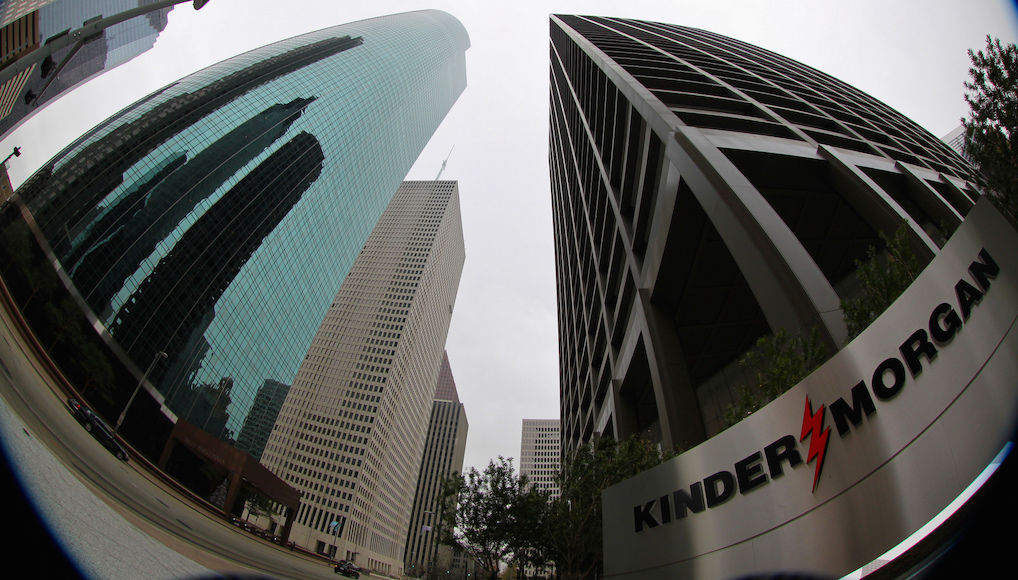The Texas-based company Kinder Morgan — formerly known as Enron Liquids, formed and staffed at the highest levels by veterans of Enron, a fraudulent company — has the Canadian government doing its bidding, as it looks to expand its Trans Mountain pipeline.
Kinder Morgan operates, with regular spills, a 1953 pipeline that delivers refined petroleum and crude oil from Alberta to B.C. destinations in Cranbrook, Abbotsford, and ultimately Burnaby, where the crude is refined into gasoline for lower mainland B.C. drivers, or shipped out mainly to the U.S. through tankers.
As economist Robyn Allan has documented, Kinder Morgan pays little in taxes — about $1.5 million a year from 2009-2013 — while “gushing” dividend income to its U.S. owners.
In this respect, Kinder Morgan fits a well-known model of Canadian resource development. Governments provide infrastructure so that foreign companies can ship out resources and profits, while paying little in provincial royalties or corporate taxes.
On April 8 the Houston pipeline company, promoting its Trans Mountain expansion (TMX), served the federal Liberal government with an ultimatum.
Kinder Morgan told Justin Trudeau to deal with the B.C. government’s opposition to the project before May 31, or else the planned twinning of the existing pipeline that delivers refined petroleum and crude oil from Edmonton to B.C. will not be funded.
In response to the Kinder Morgan ultimatum, B.C. Premier John Horgan indicated that the interests of British Columbians, and Canadians, had to come before the interests of Texas boardrooms.
Kinder Morgan wanted it known that its board of directors was unwilling to undertake the risks associated with spending over $7 billion on the project to bring diluted bitumen to the coast without support from the government of British Columbia and other “stakeholder” interests.
In response, Trudeau summoned the B.C. and Alberta premiers to an Ottawa meeting on Sunday. The prime minister has insisted the pipeline will be built; Alberta premier Notley is four-square behind TMX.
Rather than an attempt to mediate between leaders of the two provinces, the meeting was about squeezing the B.C. premier.
Following the Ottawa summit, the Alberta government introduced Bill 12 to give itself the authority to control the export of petroleum products to B.C. This measure will allow Alberta to boost already high gas prices in the neighbouring province, in the hopes of pushing the population to support TMX.
To appease Kinder Morgan, Trudeau and Alberta premier Rachel Notley have come to an agreement to cover any financial risks incurred by the Texas company in the building of the controversial project that would increase tanker traffic in B.C. coastal waters sevenfold.
Ottawa asserts it has the constitutional authority to approve the project. And, true enough, cross-border commerce does constitute a federal responsibility.
Historically, however, Canadian jurisprudence has preferred to recognize joint and shared responsibility, between the two levels of government, especially in areas such as environmental protection — ones not expressly covered by the division of powers outlined in the Constitution Act (1867).
The Constitution Act (1982) added seven new parts to the 1867 Constitution. Part Six confirmed provincial legislatures have exclusive jurisdiction over non-renewable natural resources. This, for example, allows the B.C. government to exercise its authority over oil tanker traffic in the coastal waters dear to Aboriginal Peoples.
Moreover, Part Two safeguards Aboriginal rights in Section 35. All governments and the courts are bound to respect those rights.
In 2016 Canada removed its objections to the United Nations Declaration on the Rights of Indigenous Peoples (UNDRIP), and in 2017 the Government of British Columbia announced it would govern in accordance with the UNDRIP principles.
Rather than leave vital matters for the courts or governments to deal with alone, the Union of British Columbia Indian Chiefs is calling on citizens to support wide-scale action through Coast Protectors. Supporters include the mayor of Burnaby and the federal MP for Burnaby South, Kennedy Stewart, as well as Indigenous people.
Indigenous nations whose ancestral lands and waters include the site of the construction and the operation of the current pipeline want a broad coalition strong enough to block TMX on the ground.
As the updated Summary Risk Assessment of the Trans Mountain Pipeline Expansion prepared by the Indigenous Network on Economies and Trade (INET) concludes: “Nothing the government or the company can do will earn the project approval from the Secwepemc and other Indigenous Peoples who hold Aboriginal title and rights.”
The B.C. TMX opposition can appeal to constitutional authority, mobilize climate justice activists, and deliver a serious blow to the re-election of any elected official who sides with the Texans against Indigenous rights.
The Trudeau government is totally unprepared to deal with civil action on the scale that is likely to emerge in greater Vancouver with a population of nearly 2.5 million to draw upon for activist protest.
Duncan Cameron is former president of rabble.ca and writes a weekly column on politics and current affairs.
Photo: Roy Luck/Flickr




